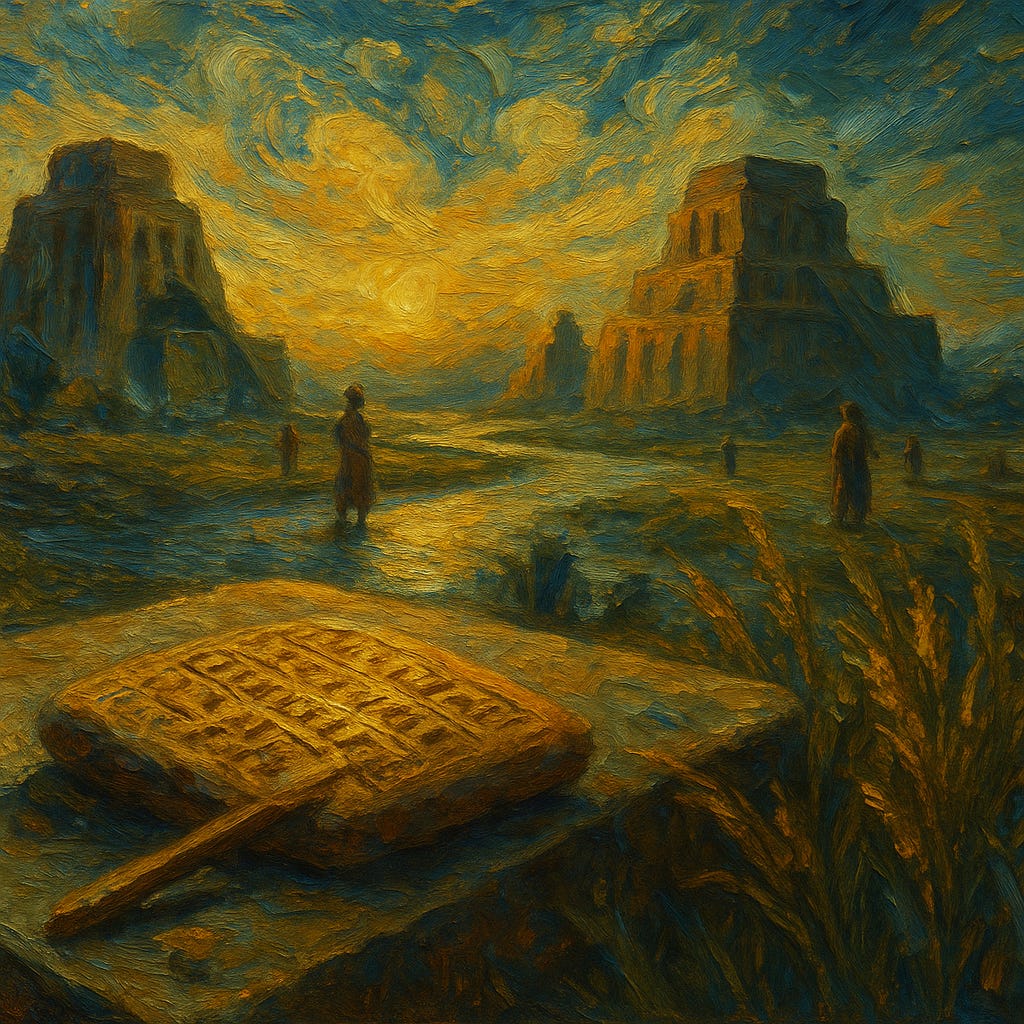🏺 When the Fields Fought Back: Part II — Empires of Order
How anxiety about the harvest became the blueprint for civilisation
3 000 BCE → 1 500 CE
🌾 The Age of Ledgers
The first cities rose from mud and bookkeeping.
Clay tablets in Sumer hold not poems but beer rations, grain counts, and temple debts. Every mark said the same thing: the harvest happened, the temple remembers, don’t be afraid.
Writing wasn’t born to tell stories—it was born to steady the heartbeat of a nervous people. When the Nile rose, or didn’t, a scribe took note. To record was to pray.
And the gods, it seemed, favoured those who kept tidy accounts.
🏛️ The Divine Bureaucracy
Kings first claimed heaven’s mandate because it sounded more stable than luck.
A Pharaoh’s true miracle was not divinity, but administration.
Temples became granaries, rituals became audits; priests kept minutes of eternity.
To sacrifice was to balance the books of the cosmos, a lamb for rainfall, incense for victory. If everyone believed the gods demanded the same thing, no one had to panic alone. Civilisation began as a promise whispered together: don’t be afraid.
⚖️ The Law of the Floodplain
When Hammurabi carved his rules into basalt, it wasn’t philosophy—it was risk management. The gods were erratic; stone was not. To write a law was to build a levee against chaos.
But permanence brings paradox: once a law exists, so does the crime of breaking it.
Every code breeds heretics, every order its own undoing. The history of civilisation could be written as a sequence of corrections:
innovation → outrage → orthodoxy.
🕊️ One God, One Empire
When the old gods failed to keep the floods in line, people tried one sky, one throne, one will. Monotheism was less invention more exhaustion—a world too tangled seeking one clear voice. It promised justice that didn’t depend on the weather, mercy written in law instead of rain.
For a while, it worked. It bound tribes into nations, kings to commandments, hearts to something larger than themselves. But when that single voice fell silent, there was nowhere else to turn. The silence was unbearable.
So people began to argue—not to destroy faith, but to hear it again.
Prophets, mystics, reformers, heretics: each holding up a shard of the broken mirror, insisting theirs still caught the light. Not rebellion, but longing. Even eternity, it turned out, could not stand still.
⚙️ The Empire Habit
Rome, Persia, China—all tried to freeze order by expansion. Empire was agriculture with an army: guard the borders, tax the surplus, praise tradition. Every new province meant new scribes, new rituals, new reasons to say the world was still in balance.
When cracks showed, the answer was always the same:
Return to virtue. Return to the old ways.
But every restoration thickened the bureaucracy. By the late Middle Ages, Europe’s monks copied prayers not out of faith, but inertia—anxiety turned to handwriting.
📜 The Restoration Loop
Collapse. Revival. Dogma. Reform. Collapse again.
A pattern carved deeper than the rivers.
Every empire feared the outsider—barbarian, heretic, infidel—and in fighting them, became them. Rome learned from Greece, the Caliphate from Persia, China from the steppe Every purification absorbed the impurity it feared.
Every attempt at permanence only quickened the pace of change.
🌀 Takeaway
The civilised world was built by people desperate to make the weather obey.
Temples, taxes, law codes—all were levees against chance. But the higher the levee, the greater the flood when it broke.
By the 1400s, the scribes were tired, the archives were heavy, and faith was written in triplicate. Civilisation was drowning in its own ink. Then came a press, a hammer, and a monk with questions.
Next up 👉 Part III: The Paper Earth —
How words, ledgers, and machines remade the world



